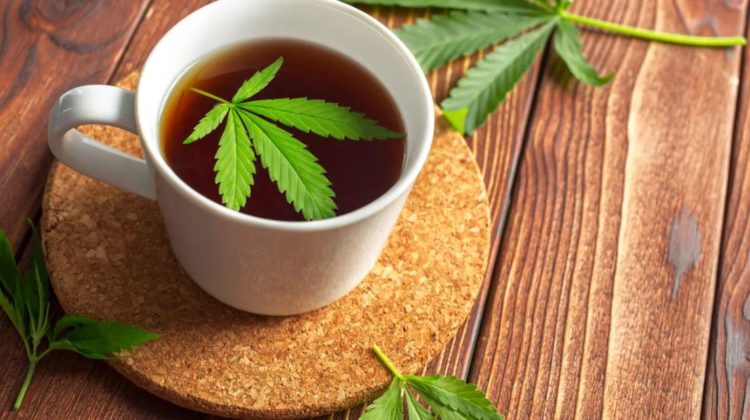
Cuppa cannabis tea. Photo credit: FabrikaSimf
In most nations, including the U.S., drinking tea first thing in the morning is the standard. Black, green, white and Pu’er or loose-leaf teas are the most popular. Cannabis tea is another type of tea that has lately acquired popularity. That is for a lot of reasons; the most important of which are relaxation and decreasing loads of sugar and fat that usually come with eating edibles.
Brief History of Cannabis Tea
Humans have consumed cannabis tea for thousands of years for both recreational and medicinal purposes. The plant has been ingrained in different cultures for millennia.
For instance, humans used the tea for pain and for recreation around 10,000 years ago in ancient China, according to The Schaffer Library of Drug Policy. Ancient religious books from Taiwan even recommend steeping and ingesting cannabis to reach a greater level of spiritual enlightenment. For instance, humans used the tea for pain and for recreation around 10,000 years ago in ancient China, according to The Schaffer Library of Drug Policy.
Additionally, ancient Greeks used cannabis tea and paste to cure animals, including horses. According to the Journal of Cannabis Therapeutics, they soaked rags in cannabis tea and placed on wounds, making this one of the oldest known veterinary applications of cannabis in history.
So What Exactly is Cannabis Tea?
Cannabis tea is a special type of tea that contains varying levels of cannabinoids like CBD and THC. To put it another way, it’s a basic tea that’s been infused with cannabinoids.

Cannabis tea is full of vitamins, minerals and antioxidants. People drink it to reduce anything from illness to stress.
Evidence shows that cannabis tea could help fight chronic pain. The pain-fighting effects are provided by cannabinoids. When one consumes cannabis, the digestive tract and liver absorb them.
Typically, the tea takes effect in about 30-80 minutes. Similar to edibles, the effects are usually felt for around four to eight hours, but it might take a couple of hours to feel the onset of effects.
As a result, rather than being dosed multiple times a day, one cup of tea delivers prolonged pain relief.
Benefits of Cannabis Tea
Although the FDA has not authorized cannabis tea, or other infused edibles or drinks, data indicates that these products may be quite helpful.
For example, a study by Surgical Neurology International reveals that cannabis has strong neuroprotective effects and plays an important function in regulating emotional behavior. The plant also includes antioxidants, which help repair and prevent damage to DNA. Additionally, it is a powerful anti-inflammatory, and may also reduce pain and swelling.
As a result, cannabis-infused tea can be especially useful for chronic illnesses such as cancer, AIDS, multiple sclerosis (MS) and rheumatoid arthritis (RA).
The beverage may also be helpful for those who suffer from stress, anxiety and depression, some of the most prevalent afflictions. According to World Health Organization (WHO), an average of 350 million people are estimated to have depression. And one in 13 individuals all around the world suffers from anxiety.
Additionally, cannabis tea provides an alternative for those who want to experience the benefits of cannabis without smoking it. This might be particularly helpful for those with respiratory issues.
Cannabis tea may also enhance one’s lung functioning. It acts as a bronchodilator, decreasing resistance in the respiratory tract and increasing airflow. Cannabis may even be helpful in treating lung cancer. In fact, Harvard University researchers have concluded that the active substance in cannabis, THC, decreases lung cancer tumor growth by 50% in rats with human lung cancer cells.
Cannabis Tea and Severe Diseases
Nausea is, unfortunately, a characteristic symptom of numerous diseases. Many people experience it regularly, particularly those undergoing chemotherapy. Research shows that THC, the psychoactive substance in cannabis, can relieve nausea and stimulate appetite. For example, The British Medical Association’s analysis of 13 studies shows that nausea and vomiting following chemical therapy is one of the most supported medicinal applications of cannabis.
High blood pressure and blocked arteries have been proven to lead to heart and cardiovascular crises. A study in the journal Pharmacological Research shows that cannabis reduces blood pressure and enhances the circulation of body cells. The components in cannabis essentially open up the arteries by relaxing and extending them.
Cannabis Tea Supplements
Some individuals also add extra ingredients for additional advantages to their cannabis tea.
For example, some add chamomile to help with sleep; ginger for stomach-related issues; a squeeze of lemon juice for vitamin C; or basil, an ingredient with antimicrobial and antiviral properties.
Where to Buy Cannabis Tea?
There’s a wide range of cannabis teas available on the market. They come in various formulations as well, from loose teas to tea bags, and more. Many simply require users to infuse them with warm water in order to be ready for use. But keep in mind that cannabis tea does not store well and is better fresh.
One can also create their own cannabis tea at home by brewing fresh tea and adding dry cannabis leaves, or a few drops of CBD or THC rich oil in it. In that case, consumers may add butter or milk to the tea to boost the absorption of the cannabinoids, which are fat soluble. Since CBD is hydrophobic, any addition of fat would enhance the bodily uptake of the elements.
Nowadays, cannabis tea receives a lot of attention and for all the right reasons. Its various advantages entice more tea producers. While cannabis is kind of bitter in taste, it is now combined with various flavors that make it taste pleasant. As always, we recommend that consumers start low and slowly increase their dosages to achieve the greatest effect.
As the Minister of Leaves writes, “enjoy life sip by sip, not gulp by gulp.”


Wow, this tea is pretty beneficial! Nicely written!